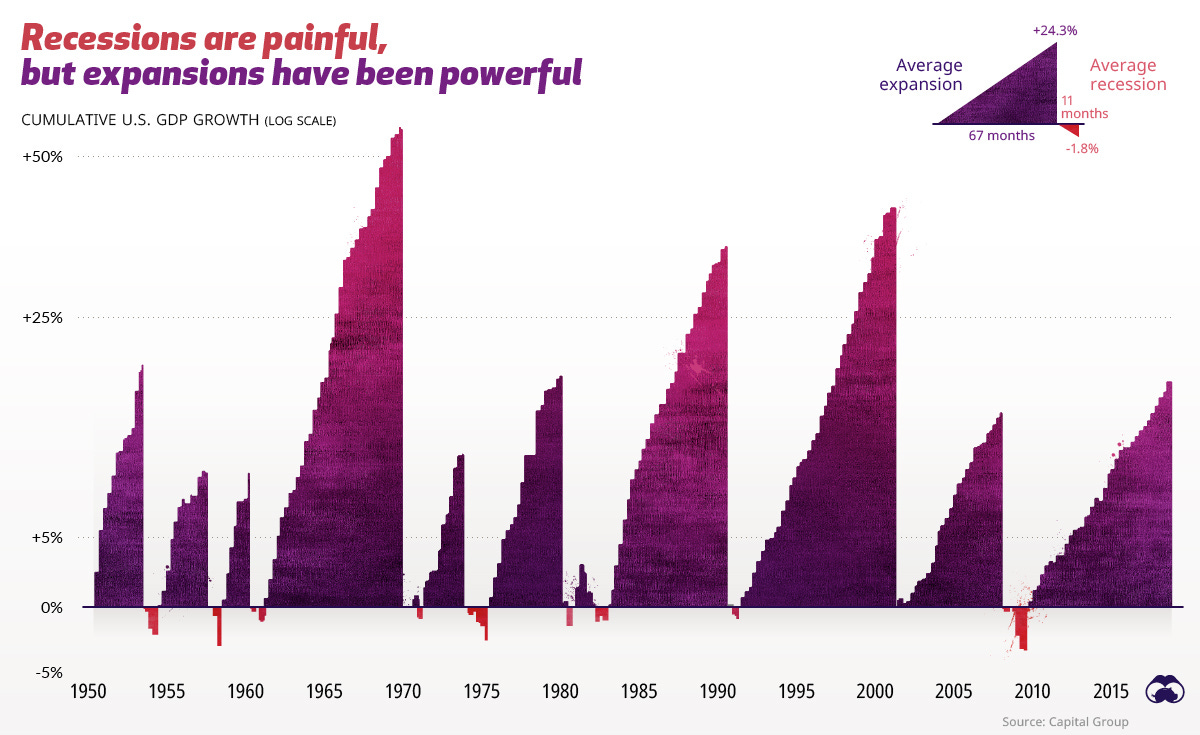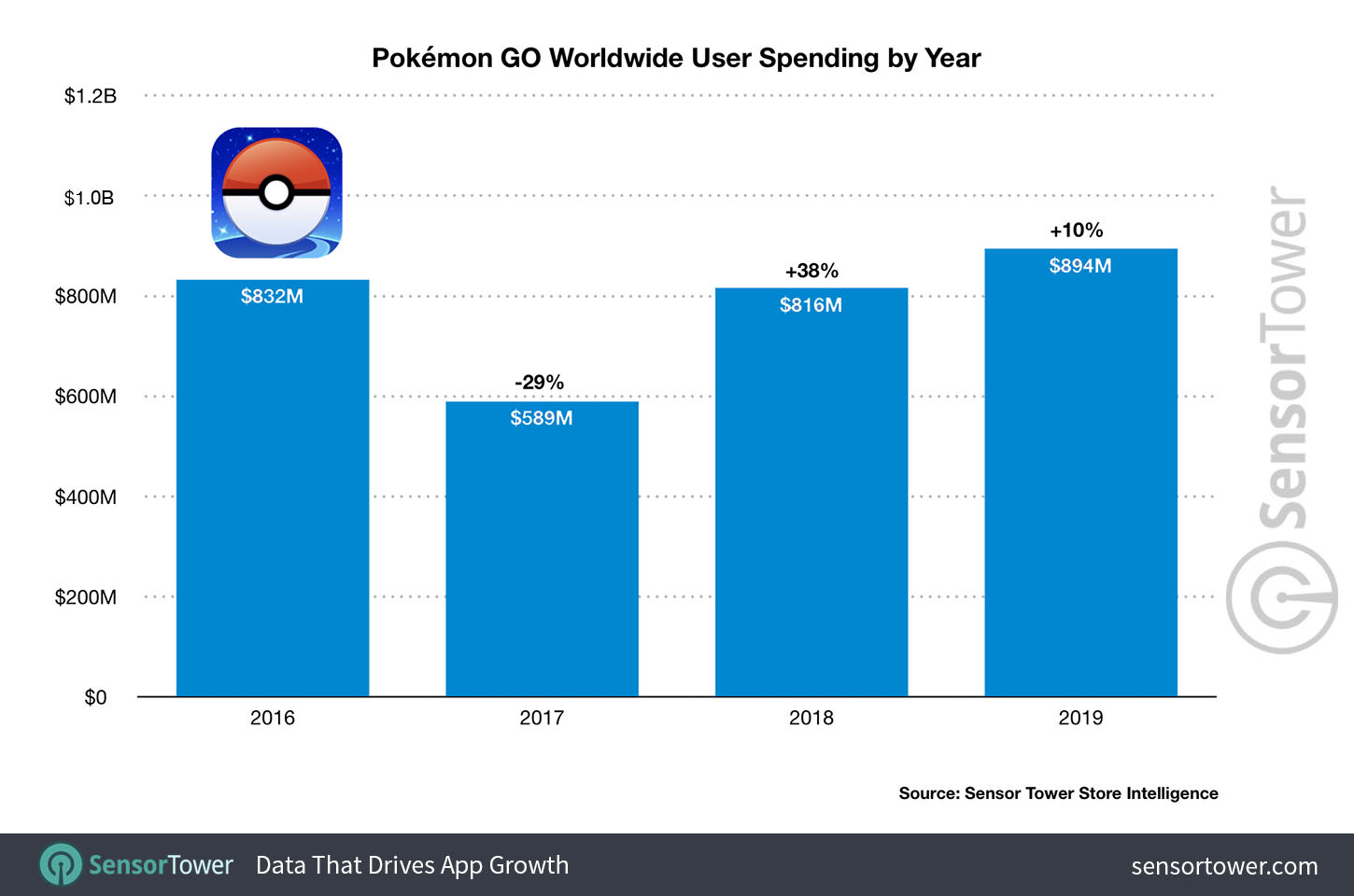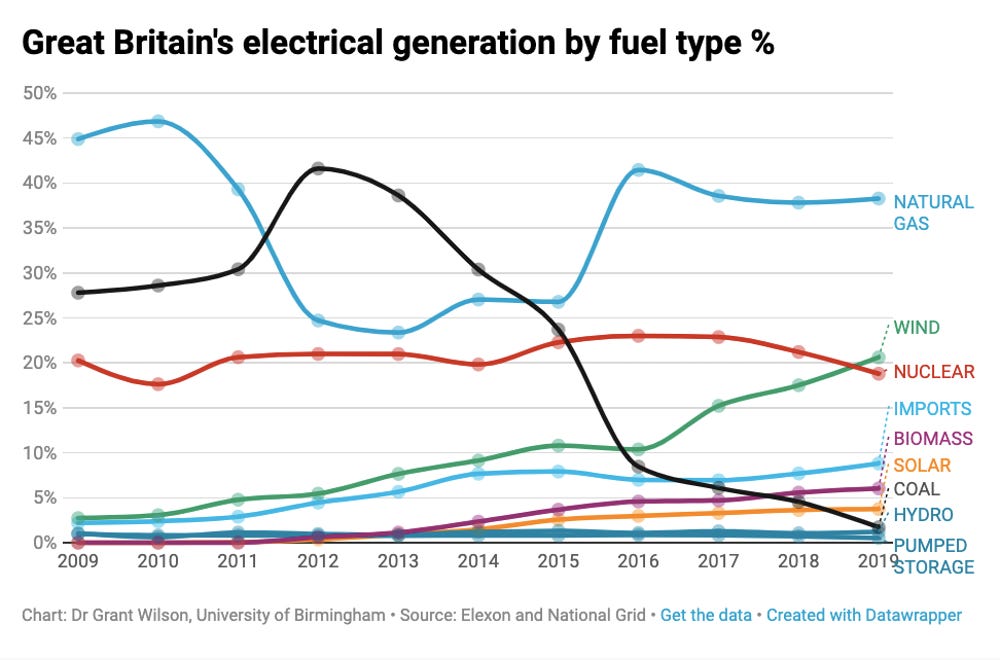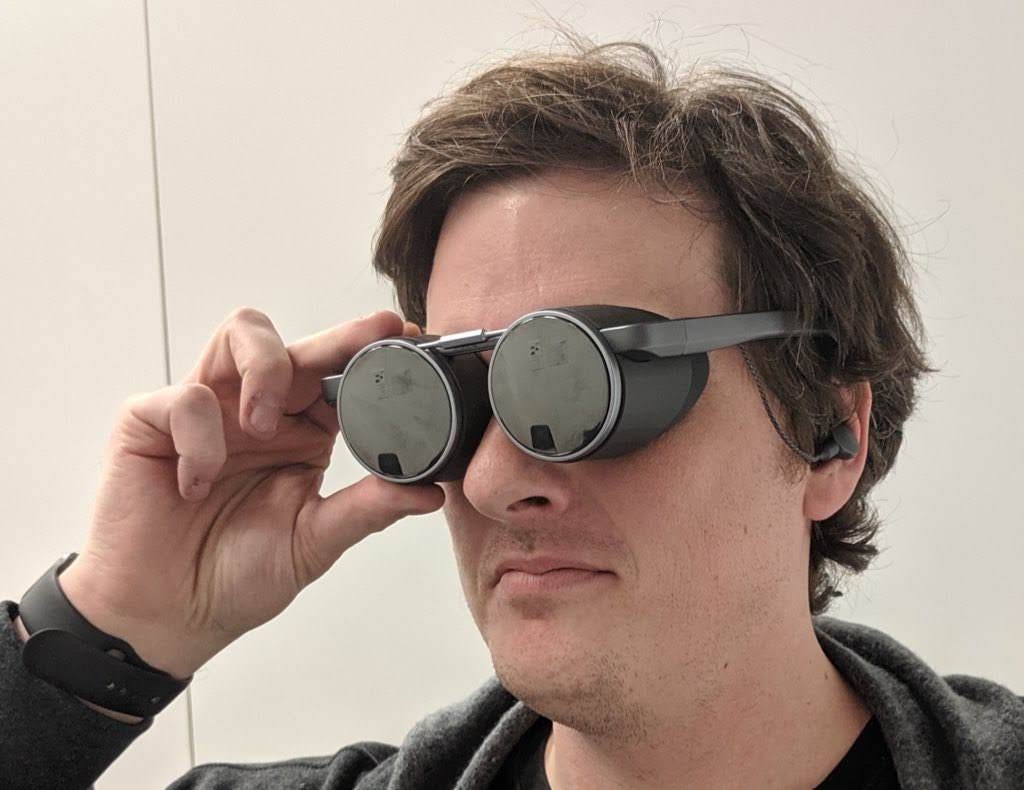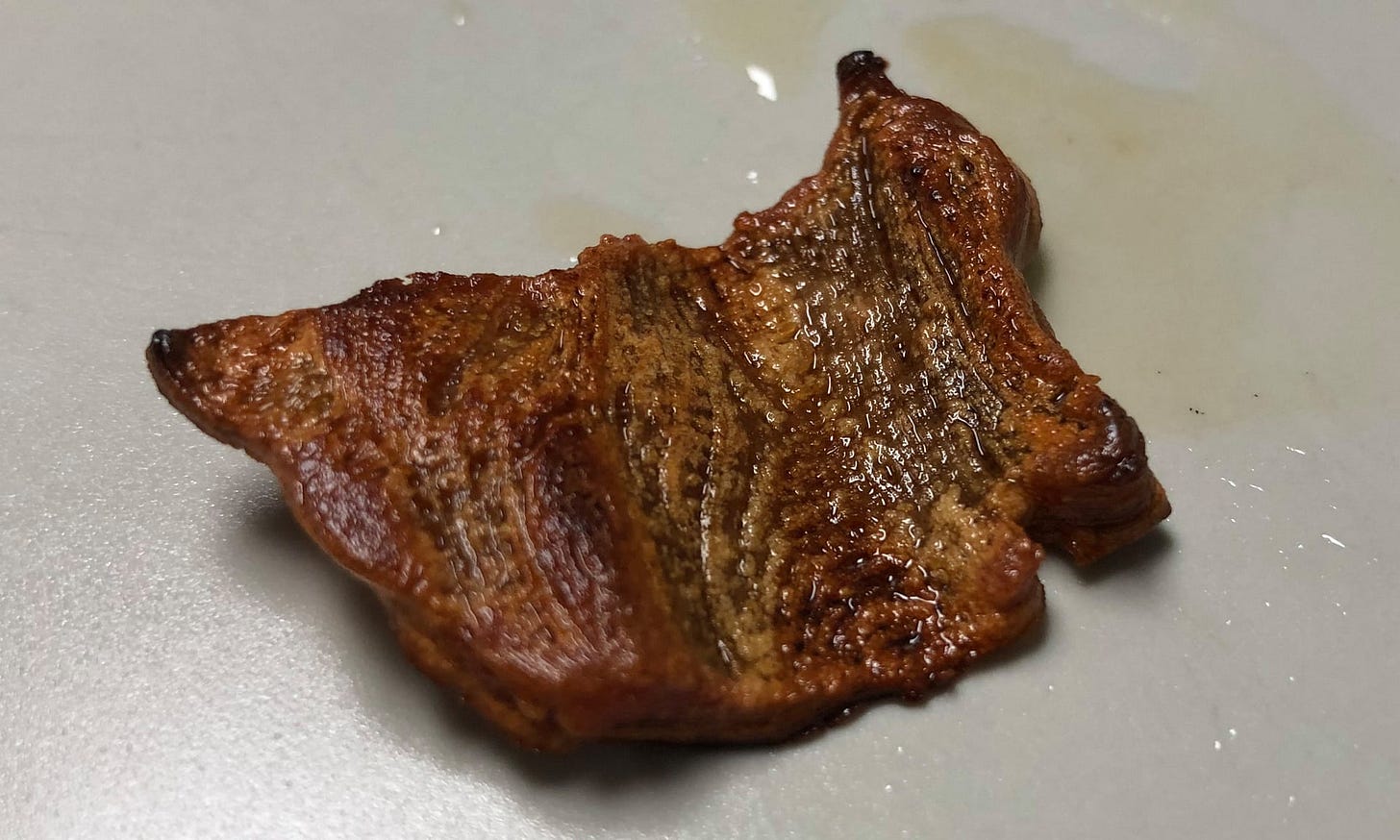Here’s your weekly wrap of technology, innovation, and finance news.
? Finance
The Visual Capitalist highlights the impact of previous recessions and expansions on cumulative GDP growth.
A recent paper looking at AI-based investing strategies show they’ve struggled to live up to expectations.
? Biology
The New York Times looks into altering the DNA of an entire species in an article titled “The Gene Drive Dilemma: We Can Alter Entire Species, but Should We?” – a fascinating and scary topic.
“This notion of permanently altering the genetics of an entire species — it goes against everything I was trained to think,” says Kuiken, who served on the United Nations’ technical experts committee for gene drives. “What’s hard to accept is that, at this point, it might end up being our best option. There’s this kind of fantasy that we can go back, that we can restore some lost Eden. But the reality is that we aren’t making those choices.”
? Robotics
Agility Robotics are beginning to sell a bipedal robot called Digit that can pick up boxes for a price in the low-to-mid six figures. The first production run is for just six units, with the first two units being sold to Ford to research last-mile package delivery.
? Chips and Computing
A Goldman Sachs survey last month showed that among technology executives at large companies, Microsoft Azure remains a more popular cloud computing provider than Amazon Web Services.
Intel will soon make Optane DC persistent memory available on workstations. Persistent memory sits between DRAM (memory) and SSDs (storage) in terms of speed, and its addition should speed up memory-heavy workloads that are currently forced to access the SSD.
Optane DC persistent memory is poised to have a transformative impact on the storage hierarchy, and industry experts are anticipating rapid and significant growth. In a 2019 Flash Memory Summit presentation, Jim Handy of Objective Analysis predicted revenues of 3D XPoint—the non-volatile memory technology that Intel branded as Optane—in excess of $3.5 billion through 2023.
IBM’s quantum-computing service now has over 100 customers, up from 40 a year ago.
? Blockchain and Crypto
NBA player Spencer Dinwiddie is planning to convert part of his three-year $34.36 million contract into an upfront payment by selling digital tokens on the Ethereum blockchain. The tokens effectively act as a bond with a 4.95% interest rate, a full pay out in 2023, and become tradeable 12 months after the initial sale.
? Gaming
Remember how Pokémon GO launched with a bang and then faded away? Turns out the game just had its best year ever with an estimated $894 million in gross player spending according to estimates from Sensor Tower.
Blizzard have decided to outsource some of their esports competitions. ESL (owned by Modern Times Group in Sweden) announced last week that they’d be running ESL Pro Tours for StarCraft II and Warcraft III: Reforged in 2020, with Blizzard contributing $4.6 million in prize money for the first season of both Pro Tours.
Overwatch League enters its third year this year and will see a major change in its format as the league shifts to home-and-away matches. With teams spread around the world, @snivyTsutarja highlights the intense travel schedule this will create. London Spitfire is expected to travel the furthest with over 76,000 miles (over 123,000 kilometres) of travel planned in 2020.
? Health
Scientists at MDI Biological Laboratory have been able to increase the lifespan of a nematode worm (commonly used for lifespan research) by fivefold, which would be equivalent to a human living for 400 or 500 years.
The new research uses a double mutant in which the insulin signaling (IIS) and TOR pathways have been genetically altered. Because alteration of the IIS pathways yields a 100 percent increase in lifespan and alteration of the TOR pathway yields a 30 percent increase, the double mutant would be expected to live 130 percent longer. But instead, its lifespan was amplified by 500 percent.
On Saturday Chinese researchers revealed a draft genome of the virus that’s causing the pneumonia outbreak in Wuhan. Releasing the draft genome is letting researchers around the world help to develop an antibody.
Baric hopes this virus’s discovery and the response to it illustrate the speed at which scientists can move by working together. “One of the things that’s sad is that the public doesn’t realize how incredibly competent the public health and the basic science community are at going from a newly discovered virus to a tremendous amount of capacity to trace and try to control its spread,” Baric says.
DNA testing company 23andMe has, for the first time, sold the rights to a drug it developed using its customers’ data.
23andMe has sold in excess of 10 million DNA testing kits. More than 80 per cent of their customers have agreed to their data being used by the company for research and by scientists trying to understand the causes of diseases and how best to treat them.
A trial has started in Sydney that gives prospective parents free access to pre-pregnancy genetic tests. The tests identify situations where both prospective parents carry a recessive gene that could lead to a genetic disease.
AI and lasers are being used to help speed up the diagnosis of brain tumours during surgery.
The traditional method, which requires sending the tissue to a lab, freezing and staining it, then peering at it through a microscope, takes 20 to 30 minutes or longer. The new technique takes two and a half minutes. Like the old method, it requires that tissue be removed from the brain, but uses lasers to create images and a computer to read them in the operating room.
? Renewables
Denmark passed 50% in renewable electricity generation in 2019 due to a large expansion in wind power.
Britain’s electricity since 2010 has seen wind surge to second place, coal collapse, and fossil fuel use nearly halve.
China announced over the weekend that they wouldn’t cut subsidies for new energy vehicles in 2020 like they did last year. The move should benefit Tesla’s new plant in China, domestic competitors like BYD and NIO, and battery manufacturer CATL.
? Virtual and Augmented Reality
Mark Zuckerberg is pitching AR and VR as a potential solution to the housing crisis (eventually) in his 2030 outlook letter.
Augmented and virtual reality are about delivering a sense of presence — the feeling that you’re right there with another person or in another place. Instead of having devices that take us away from the people around us, the next platform will help us be more present with each other and will help the technology get out of the way. Even though some of the early devices seem clunky, I think these will be the most human and social technology platforms anyone has built yet.
The ability to be “present” anywhere will also help us address some of the biggest social issues of our day — like ballooning housing costs and inequality of opportunity by geography. Today, many people feel like they have to move to cities because that’s where the jobs are. But there isn’t enough housing in many cities, so housing costs are skyrocketing while quality of living is decreasing. Imagine if you could live anywhere you chose and access any job anywhere else. If we deliver on what we’re building, this should be much closer to reality by 2030.
UploadVR calls Panasonic’s new prototype VR glasses intriguing because they’re significantly lighter than comparable headsets while providing a high resolution image where crisp text is visible and there’s no screen door effect.
VentureBeat explored all the other VR and AR developments at CES 2020, arguing that VR and AR are thriving.
? Alternative Foods
Will we soon reach peak meat? The Atlantic discusses.
Although nine in 10 Americans don’t consider plants an acceptable substitute for meat, they increasingly consider plant-based “meat” products—like burgers from Impossible Foods, and sausages from Beyond Meat—an acceptable complement. The investment firm UBS projects that the plant-based meat market will grow by a factor of 20 this decade, reaching $85 billion in annual sales by 2030. Cases of plant-based proteins shipped to commercial restaurants rose last year by more than 20 percent, while regular meat’s sales grew by only 2 percent.
KFC launched a plant-based chicken sandwich in the UK.
Impossible Foods now makes pig-free pork.
A plant-based steak has been revealed that mimics the texture and appearance of a real meat steak. The company behind the steak, Novameat, creates the steak by copying the structure of real meat using a patented micro-extrusion technology that can produce fibres at between 100 and 500 microns in diameter. The 50g steak costs $1.50 to make, which is similar to supermarket prices for traditional stake, but that cost will come down as the production process is scaled up. They’re still working on the taste.
⚡ Other Snippets
Sound vibrations can be used to shake metal alloy grains into a tighter formation during 3D printing according to a Nature Communications study led by Carmelo Todaro from RMIT. This can have implications for 3D printing building lunar colonies.
The Atlantic looks at how bots are destroying political discourse, highlighting how widespread fake public comments have become.
The Google AI Blog summarised everything Google Research achieved in 2019 and their focus for 2020.
Virgin Galactic CEO George Whitesides appeared on CNBC to say they’ve seen steadily increasing demand from prospective space tourists and plan to re-open sales later this year. The company aims to begin commercial operations this year and aims to be profitable by 2021.
Travelex currency exchange counters were forced offline by a ransomware attack on New Year’s Eve. The hackers demanded a $6 million random.
CNBC profiles Australian entrepreneur Melanie Perkins from Canva in a piece titled “How a 32-year-old turned a high school yearbook idea into a $3.2 billion business”.



